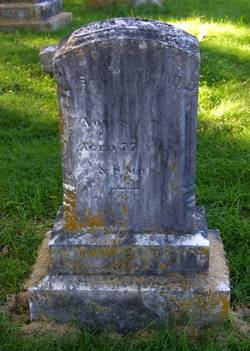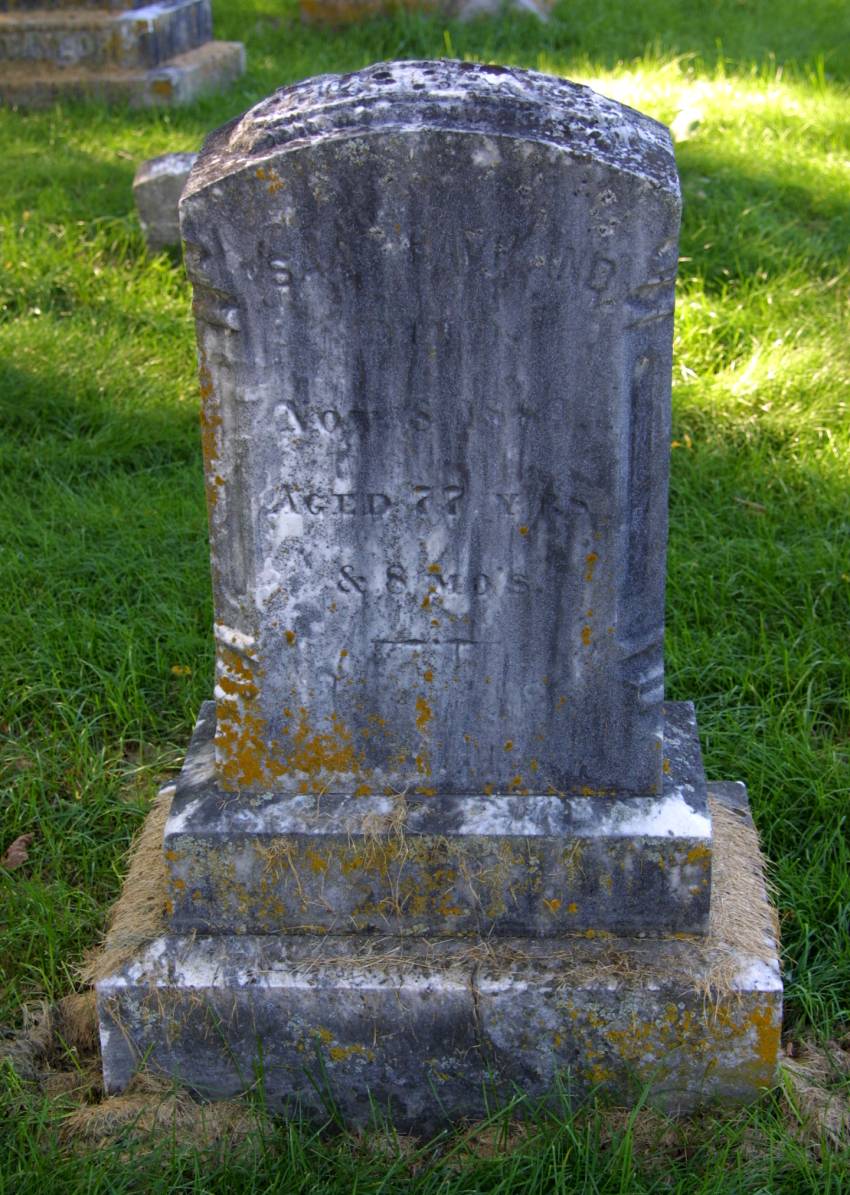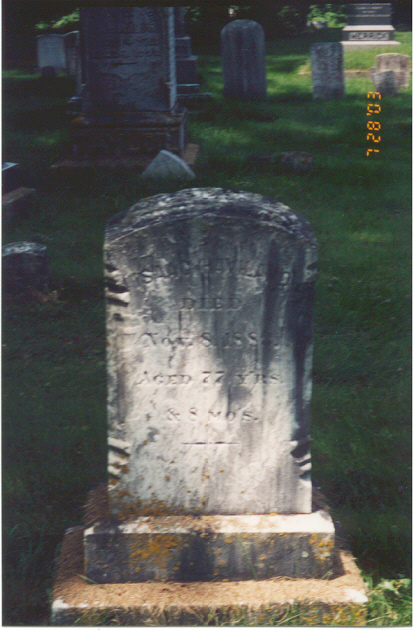----------------
REVIEWS EARLY LIFE OF PETER W. COLLINS AS FARMHAND ON KNAPP FARM
J.C. Merrick Says His Grandfather Found Him a Hard Worker and Most Dependable.
In a recent issue of the Courier we read the life of Peter Collins and it brought back early reminiscences. As we recall, his first position was with my grandfather, the late John Knapp, of Patterson, who then lived where William Ackerman now resides. Here he remained two seasons. As a boy we spent much time at grandfather's, and well recall when he started his time, as it was called in those days.
His first work was to bore an auger hole in a gate post and fit a pin in the hole. This was to hold the gate-hook in the staple, so the cows when rubbing against it could not swing it open. Although he had around a mile and a half to come to his work, he was on the job at 5 in the morning.
Later he and I planted a piece of corn. It was a piece with no short rows, as they had been previously planted to potatoes. The hand corn planter had recently appeared on the market, but our boss, like other elderly farmers, was skeptical. Six hills were planted with it, two had no corn in them and the other four had from one to ten kernels. That was all grandfather wanted of the new fan-dangled way of planting corn, so we proceeded the old way. Peter dropped a row and I covered; then I dropped the next row and he covered, and so on until the field was planted.
Our orders were three kernels to the hill (and no more), one and one-half hoe's full of dirt on each hill with a firm imprint of the hoe left on each and every hill (no sod of any kind to be used).
When the job was completed we were told to count the rows; also the hills in a row. That night we were given an example to ascertain the number of hills in the piece; also the number of kernels it took to plant it. In doing this we figured the King Hill, as a hill with three kernels. When the corn came up grandfather said, "Boys, I see you didn't forget to plant a king hill, which I believe is customary among corn planters."
During his second season Isaac Haviland, who then resided where Lillian MacIsaac now conducts a nursing home, spent the day at grandfather's. As a boy both of these gentlemen seemed very old, and we were interested in their conversation, which we will later quote as we recollect.
Uncle Ike, as he was known, was for his time a very prosperous man; he lived in a new home, had a new barn, a grist, cider, saw and plaster mill; also carded and wove cloth. He owned three, farms clear of incumbrance, had holdings in what then was the pine timber belt of Ohio; he also had $10,000 on bond and mortgage; was four times married. The christian names of his wives were Laura, Jane, Augusta and Cordelia, who survived him by some six months. He died at 77 and is buried at the Four Corners Cemetery. Politically he was a Democrat. But, despite the fact that he looked well to his cash, he was a willing and liberal supporter of churches and schools, as he always said that on their success depended the future of this country.
In the course of his conversation he said, "John, that Collins boy seems to be a pretty good boy." "Yes," said grandfather, "Peter is a good boy; works as well alone as if I am with him. I was so well pleased with him last year that this year I am giving him a raise in salary of 50c per month, and he is to have one day off to go to the Danbury Fair." "I didn't suppose you paid him anything more than his eats and a few clothes," said Uncle Ike.
"I know the way most boys work, but I gave Peter $3.00 per month last year, and now he is getting $3.60."
"Don't see how you can afford it," said Uncle Ike. "I had that Downey boy for a spell; got so he wasn't worth anything, so I let him go and got the Cammel boy and he was worse than Bill; couldn't get him up in the morning to go for the cows. One morning the cows didn't come, so I went to see what the trouble was and found him asleep. Got so he wanted to be through work and supper eaten by 7 o'clock. Then he would gad to the depot, stay until 9 or 10 o'clock; so decided I would try it awhile alone. Costs a lot to feed a boy, and everything you buy is high; sometimes I think it's as cheap to have a man."
"A growing boy is always hungry; fill 'em up as you think you have and in a half hour they are ready to eat again." "To be sure," said grandfather. At this time grandmother announced dinner, adding she didn't care now much it cost to feed Peter. The cost of living could go sky high. Peter was a good boy and would get all he wanted while he was there.
"Exactly," said grandfather. "Isaac, let's go in and see what Hannah has for dinner. Peter, step down cellar and draw a pitcher of cider. Isaac, I believe you always have a glass with your meals." Uncle Ike allowed he usually did.
Where is the young man of today that would be willing to start life this way? The salary received wouldn't get him ready to take his best girl to the movies. But boys like Peter never had to call on Eliza or other charities.
J.C. MERRICK. Patterson, Aug. 10th, 1936
The Putnam County Courier, Carmel, N.Y., Friday Afternoon, August 14, 1936.
----------------
REVIEWS EARLY LIFE OF PETER W. COLLINS AS FARMHAND ON KNAPP FARM
J.C. Merrick Says His Grandfather Found Him a Hard Worker and Most Dependable.
In a recent issue of the Courier we read the life of Peter Collins and it brought back early reminiscences. As we recall, his first position was with my grandfather, the late John Knapp, of Patterson, who then lived where William Ackerman now resides. Here he remained two seasons. As a boy we spent much time at grandfather's, and well recall when he started his time, as it was called in those days.
His first work was to bore an auger hole in a gate post and fit a pin in the hole. This was to hold the gate-hook in the staple, so the cows when rubbing against it could not swing it open. Although he had around a mile and a half to come to his work, he was on the job at 5 in the morning.
Later he and I planted a piece of corn. It was a piece with no short rows, as they had been previously planted to potatoes. The hand corn planter had recently appeared on the market, but our boss, like other elderly farmers, was skeptical. Six hills were planted with it, two had no corn in them and the other four had from one to ten kernels. That was all grandfather wanted of the new fan-dangled way of planting corn, so we proceeded the old way. Peter dropped a row and I covered; then I dropped the next row and he covered, and so on until the field was planted.
Our orders were three kernels to the hill (and no more), one and one-half hoe's full of dirt on each hill with a firm imprint of the hoe left on each and every hill (no sod of any kind to be used).
When the job was completed we were told to count the rows; also the hills in a row. That night we were given an example to ascertain the number of hills in the piece; also the number of kernels it took to plant it. In doing this we figured the King Hill, as a hill with three kernels. When the corn came up grandfather said, "Boys, I see you didn't forget to plant a king hill, which I believe is customary among corn planters."
During his second season Isaac Haviland, who then resided where Lillian MacIsaac now conducts a nursing home, spent the day at grandfather's. As a boy both of these gentlemen seemed very old, and we were interested in their conversation, which we will later quote as we recollect.
Uncle Ike, as he was known, was for his time a very prosperous man; he lived in a new home, had a new barn, a grist, cider, saw and plaster mill; also carded and wove cloth. He owned three, farms clear of incumbrance, had holdings in what then was the pine timber belt of Ohio; he also had $10,000 on bond and mortgage; was four times married. The christian names of his wives were Laura, Jane, Augusta and Cordelia, who survived him by some six months. He died at 77 and is buried at the Four Corners Cemetery. Politically he was a Democrat. But, despite the fact that he looked well to his cash, he was a willing and liberal supporter of churches and schools, as he always said that on their success depended the future of this country.
In the course of his conversation he said, "John, that Collins boy seems to be a pretty good boy." "Yes," said grandfather, "Peter is a good boy; works as well alone as if I am with him. I was so well pleased with him last year that this year I am giving him a raise in salary of 50c per month, and he is to have one day off to go to the Danbury Fair." "I didn't suppose you paid him anything more than his eats and a few clothes," said Uncle Ike.
"I know the way most boys work, but I gave Peter $3.00 per month last year, and now he is getting $3.60."
"Don't see how you can afford it," said Uncle Ike. "I had that Downey boy for a spell; got so he wasn't worth anything, so I let him go and got the Cammel boy and he was worse than Bill; couldn't get him up in the morning to go for the cows. One morning the cows didn't come, so I went to see what the trouble was and found him asleep. Got so he wanted to be through work and supper eaten by 7 o'clock. Then he would gad to the depot, stay until 9 or 10 o'clock; so decided I would try it awhile alone. Costs a lot to feed a boy, and everything you buy is high; sometimes I think it's as cheap to have a man."
"A growing boy is always hungry; fill 'em up as you think you have and in a half hour they are ready to eat again." "To be sure," said grandfather. At this time grandmother announced dinner, adding she didn't care now much it cost to feed Peter. The cost of living could go sky high. Peter was a good boy and would get all he wanted while he was there.
"Exactly," said grandfather. "Isaac, let's go in and see what Hannah has for dinner. Peter, step down cellar and draw a pitcher of cider. Isaac, I believe you always have a glass with your meals." Uncle Ike allowed he usually did.
Where is the young man of today that would be willing to start life this way? The salary received wouldn't get him ready to take his best girl to the movies. But boys like Peter never had to call on Eliza or other charities.
J.C. MERRICK. Patterson, Aug. 10th, 1936
The Putnam County Courier, Carmel, N.Y., Friday Afternoon, August 14, 1936.
Family Members
Advertisement
Advertisement


















